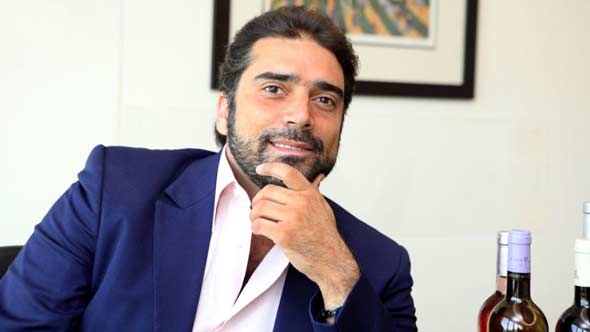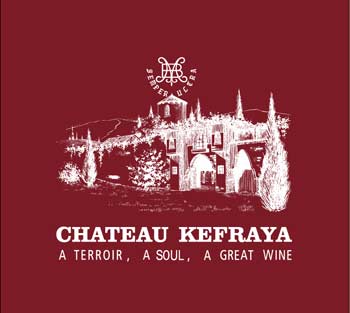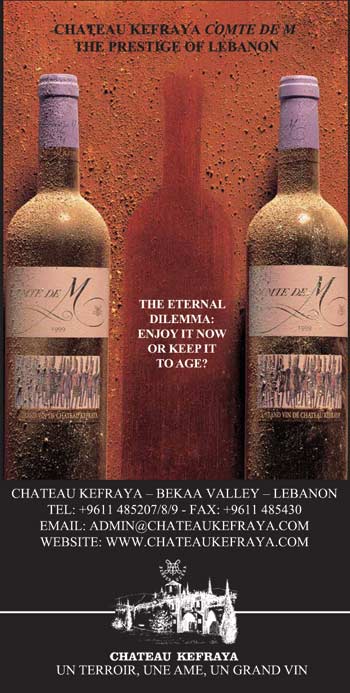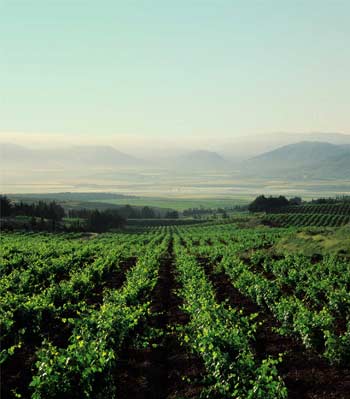Reputation of Lebanese Wines: Building of a Global Brand
Increased competition within the wine industry in Lebanon is further reinforcing the reputation of Lebanese wines and the status of Lebanon on the international (wine) scene. Lebanon is today recognized as both a wine-producing and wine-exporting country. Mr. Majdalani comments on building a global brand – Chateau Kefraya.
Interview with Emile Majdalani, Commercial Director of Château Kefraya

The trend in the wine industry in Lebanon is that more of the wineries coming to the market are now facing increasing competition, compared to when your winery began. Can you comment on this?
When the number of players increases in Lebanon, this of course means more competition. However – and especially when quality wine is being produced -, it reinforces the idea that Lebanon has become a wine-producing country. This is good for everybody in terms of exports. It is not like a few years ago when people from around the world hardly believed that grapes were grown and wines produced in Lebanon. With the many wineries emerging, reputation and quality of Lebanese wines is being increased and Lebanon itself is getting recognized as both a wine-producing and wine-exporting country which is good for everyone.
What are your plans in terms of your export market; for example, are you trying to develop in China?
We are not trying to develop in China at the moment. The export strategy is to have Château Kefraya everywhere and have quality wine production in the demand. What I mean by that is that Château Kefraya has a limited wine production and we cannot afford to distribute on a massive scale.  We are choosing our own sales channels and would like to be mainly represented in fine restaurants, liquor stores, specialized wine shops, etc.
We are choosing our own sales channels and would like to be mainly represented in fine restaurants, liquor stores, specialized wine shops, etc.
Today we are allocating our wine production in an optimal way so as to develop this quality distribution network. The purpose is to be in places where people will welcome a quality product from a different country.
Europe of course is very important for us, with high-potential markets such as France and Great Britain, but also new and emerging markets such as India and Brazil. China is a bit different because it is a special market and frankly I do not believe we have sufficient wine production to meet demand if we start distributing there.
So Château Kefraya will be focusing on quality niche products that will be channeled through the specialized high-end market. This is where we want to be.
Does your product meet all the requirements to succeed in the high-end market? Were you successful in building a global brand?
I believe it does because we have gone from twenty export countries to forty in only the last ten years. This means that it is working, the quality is there, and reputation of Lebanese wines is increasing.
This success story of this global brand is also supported by the awards you have received.
Yes, this is certainly true, but even more than the awards, we prefer critiques from wine connoisseurs which we believe are a more reliable source of acclaim. For example, when Robert Parker grades the Comte de M and Vissi d’Arte (our Prestige Wines) at 89 out of 100, it means we are very close to the 90 and thus to excellence. The renowned Canadian connoisseur Michel Phaneuf also gave five stars to the Comte de M 2007 in his guide, comparing it to the great vintages of Bordeaux. So when we receive such good reviews from worldwide connoisseurs, it is more than a gold medal for us.
…even more than the awards, we prefer critiques from wine connoisseurs which we believe are a more reliable source of acclaim. For example, when Robert Parker grades the Comte de M and Vissi d’Arte (our Prestige Wines) at 89 out of 100, it means we are very close to the 90 and thus to excellence.
What are some of the challenges you are facing as a business?
I would say that in Lebanon, the biggest challenge is Lebanon itself as a whole – the instability and the uncertainty factor. You never know what is going to happen or if you are going to be able to sell in the proper environment. So you have this political instability that is challenging us constantly and we cannot do anything about it. We just have to continue the best we can.
There are also customs changes following the Euro-Med agreement with European countries. Now, wines from Europe are entering Lebanon with fewer customs’ taxes every year and this will soon be down to zero. This creates a very competitive environment. There are wines with very good reputation coming from Europe so if we do not reinforce the quality every year, we will face very tough competition from those wines. At the same time we have an advantage in the export market to Europe because we will reciprocally have to pay fewer customs to enter those markets. Nevertheless, in Lebanon it will be challenging and we are ready.
What percentage of Château Kefraya’s market is currently in Lebanon?
It is about 60 percent, so it is still dominant in the local market but we would like it to be closer to 50-50. We are heavily pushing for the export while still strongly consolidating our leading position in Lebanon. We do not want to lose leadership in Lebanon because of our export business. I think that 50-50 would be a good balance for us.
A few years ago it seemed that the Lebanese preferred high-quality French wines. Do you think this is changing?
I am not sure they deeply preferred French wines. You are talking first of all about a minority of people because most of the wine consumed in Lebanon is Lebanese – about 70 percent.  So you are talking about maybe the 30 percent of people that when they go to an international restaurant, out of curiosity or in front of their friends, they want to taste French or other European wine. Why not? This increases their level of knowledge first of all. I would not like Lebanese people to only drink Lebanese wine because it would keep them at a limited level of wine knowledge.
So you are talking about maybe the 30 percent of people that when they go to an international restaurant, out of curiosity or in front of their friends, they want to taste French or other European wine. Why not? This increases their level of knowledge first of all. I would not like Lebanese people to only drink Lebanese wine because it would keep them at a limited level of wine knowledge.
But is the reputation of Lebanese wines improving in Lebanon? Or has their reputation always been good?
The level of Lebanese wine consumption is more or less stable despite those advantages foreign wines are gaining every year by entering the country with increasingly lower taxes. The sales level of Lebanese wines is not dropping so this means that its reputation is strong enough. And do not forget that Lebanese people are proud of their wine production industry as well. We have reached a certain level and wine production is one of the best industries we have in Lebanon and if it was not of good quality, trust me when I say they would not be drinking it. It is a fact that Lebanese wines still make up 70 percent of the total sales in Lebanon which is very indicative of the appreciation and reputation of local wine.
Château Kefraya is not only about wines, it is also about tourism. We have witnessed a recent drop in tourism because of the regional events. What is your strategy in this regard?
When you have a limited production, you have two ways to grow. You can work on your quality and become more famous over time which is of course a generator of financial growth for the company. The second way is to work on your domain, which is the set of activities that you offer to the tourists who are visiting you, namely oenotourism. In the past, visitors used to come and have a quick tasting, a quick lunch and be finished the whole experience in an hour. Today they can spend a full day in Château Kefraya; it has become more than a common-tourism location, it is a must for a tourist to come to Château Kefraya because we can keep his attention and he can also learn things in an enchanting environment.
A visitor can take the train through the vineyard or to the Roman tombs that were discovered a few years ago, have an in-depth wine tasting free of charge and visit our restaurant which serves up to 300 people simultaneously. What used to be a little snack a few years ago has turned into a real restaurant where people can enjoy good food with our wines. We are developing a museum to display the entire history of  Château Kefraya in paintings, facts and more. Soon we will have some bungalows where people can come and enjoy a good wine at night without having to drive back.
Château Kefraya in paintings, facts and more. Soon we will have some bungalows where people can come and enjoy a good wine at night without having to drive back.
We are thinking about developing a vino-therapy center in the future. As the name indicates, it is therapy for the body through the use of wine.
We also have beautiful parks and a lovely environment in Kefraya – it is not just a winery. The parks bear names of opera composers and they are beautiful places for private events as well. This has added a new dimension to Château Kefraya.
When you travel abroad with your wines, is the feedback always positive or do you still meet some resistance when selling your wine and Chateau Kefraya as a brand?
There are many good wines all around the world and certainly competition is not easy but that is why we tend to propose something that we believe is different. We have to give an added value to the consumer in order to convince him to try Château Kefraya wines and not to stick to just the local wines for example. I believe that through the blends we are developing and the quality and richness of those blends, we are offering something new. When we have seven or eight great varieties in only one wine, Les Bretèches for instance (our red seduction wine), it gives it a natural complexity because every one of those varieties is bringing something to the wine. At the same time, it gives it some richness in taste.
I believe we have the right tools to present ourselves abroad as a global brand, be it through the general quality, the blend, or the great number of varieties (about fifteen) that we cultivate in Château Kefraya.
I visit the markets as well because I believe that presence is very important; it is not only about selling your wines abroad, it is also about accompanying them and making the wines come alive. I think that with the work we do and the passion that we have, we are reaching our goals.